- Home
- William Golding
Envoy Extraordinary Page 2
Envoy Extraordinary Read online
Page 2
The Emperor leaned back in his chair and spoke to Phanocles.
"You bring the tenth wonder of the world with you.
The sweat was running down Phanocles' face. He looked at the model in bewildered relief.
"But I have not explained, Caesar-"
The Emperor waved his hand.
"Calm yourself. No harm is intended to you or your sister. Mamillius, they are our guests."
Mamillius let out his breath and looked at the Emperor. His head began to turn from side to side restlessly as though he were trying to break loose from invisible strings. Yet the Emperor's announcement had set another pattern in motion. The women ranged themselves to light the curtained doorway and the grave house dame came through it, willing to give of her plenteous store. She inclined her head to the Emperor, to Mamillius, to Euphrosyne, took her by the wrist and led her away. The curtains dropped together and the loggia was dark at last, the brightest lights were where the fishing boats danced by their nets. Mamillius came close to Phanocles and spoke to him in a voice that remembered how recently it had broken.
"What is her voice like? How does she speak?"
"She speaks very seldom, lord. I cannot remember the quality of her voice."
"Men have built temples for objects of less beauty."
"She is my sister!"
The Emperor stirred in his chair.
"If you are so poor, Phanocles, has it never occurred to you to make your fortune by a brilliant connection?"
Phanocles peered wildly round the loggia as though he were trapped.
"What woman would you have me marry, Caesar?"
Into the incredulous silence that followed his speech the nightingale spilled a rill of song. She had evoked the evening star that sparkled now in a patch of dense blue between the blacknesses of the junipers. Mamillius spoke in his rebroken voice.
"Has she an ambition, Phanocles?"
The Emperor laughed a little.
"A beautiful woman is her own ambition."
"She is all the reasons in the world for poetry."
"Corinthian is your style, Mamillius. However continue. "
"She is of epic simplicity."
"Your eternities of boredom will be sufficient for all twentyfour books."
"Don't laugh at me."
"I am not laughing. You have made me very happy. Phanocles how did you preserve this phoenix?''
Phanocles was groping in a double darkness.
"What am I to say, Caesar? She is my sister. Her beauty has come up, as it were, overnight."
He paused, searching for words. They burst out of him.
"I do not understand you or any man. Why can they not let us be? Of what importance is the bedding of individuals? When there is such an ocean at our feet of eternal relationships to examine or confirm?"
They heard in the darkness a clucking sound from Phanocles' throat as though he were about to be sick. But when he spoke, the words were at once ordered and pointless.
"If you let a stone drop from your hand it will fall."
The Emperor's chair creaked.
"I hope we are following you."
"Each substance has affinities of an eternal and immutable nature with every other substance. A man who understands them-this lord here-"
"My grandson, the Lord Mamillius."
"Lord, do you know much of law?"
"I am a Roman."
Mamillius felt the wind of arms flung wide. He peered into the darkness of the loggia and made out a dark gesticulating shape.
"There then! You can move easily in the world of law. I can move in the world of substance and force because I credit the universe with at least a lawyer's intelligence. Just as you, who know the law, could have your way with me since I do not, so I can have my way with the universe."
"Confused," said the Emperor. "Illogical and extremely hubristic. Tell me, Phanocles. When you talk like this do people ever tell you you are mad?"
Phanocles' bewildered face swam forward in the gloom. He sensed the model and hoped to avoid it. Then there was something before his face-a sword blade that glistened dully. He backed clumsily away.
The Emperor repeated the words as though he had not said them before.
"-tell you you are mad?"
"Yes, Caesar. That is why I-severed my connection with the library."
"I understand."
"Am I mad?"
"Let us hear further."
"The universe is a machine."
Mamillius stirred.
"Are you a magician?"
"There is no magic."
"Your sister is a living proof and epitome of magic."
Phanocles turned, tormented, to the Emperor.
"That is how they all talk, Caesar. Poetry, magic, religion--"
The Emperor chuckled.
"Be careful, Greek. You are talking to the Pontifex Maximus."
Phanocles darted the shadow of a finger at his face.
"Does Caesar believe in the things that the Pontifex Maximus has to do?"
"I prefer not to answer that question."
"Lord Mamillius. Do you believe in your very heart that there is an unreasonable and unpredictable force of poetry outside your rolls of paper?"
"Then she is beyond Nature's legislation.
"That may well be. Is there any poetry in your universe?"
"How dull your life must be!"
"Dull?"
He took a half-step towards the Emperor, remembered the sword and stopped in time.
"My life is passed in a condition of ravished astonishment."
The Emperor answered him patiently.
"Then a mere Emperor can do nothing for you. Diogenes was no happier than you in his tub. All I can do is to stand out of the sun."
"Yet I am destitute. Without your help I must starve. With it I can change the universe."
"Will you improve it?"
"He is mad, Caesar."
"Let him be, Mamillius. Phanocles, in my experience, changes are almost always for the worse. Yet I entertain you for my-for your sister's sake. Be brief. What do you want?"
There had been obstruction. The ship, not his sister, was the tenth wonder; he could not understand men, but with this ship the Emperor would be more famous than Alexander. Mamillius had ceased to listen and was muttering to himself, and beating time with his finger.
The Emperor said nothing as Phanocles rambled on, did nothing, but allowed a little cold air to form round him in the darkness and extend outwards. At last for all the man's insensitivity he faltered to a stop.
Mamillius spoke.
"The speechless eloquence of beauty-"
"I have heard that before somewhere," said the Emperor thoughtfully. "Bion, I think, or is it Meleager?"
Phanocles cried out.
"Caesar!"
"Ah, yes. Your model. What do you want?"
"Let a light be brought."
One of the women returned with the ritual solemnity to the loggia.
"What is your model called?"
"She has no name."
"A ship without a name? Find one, Mamillius."
"I do not care for her. Amphitrite."
Mamillius yawned elaborately.
"I think, Grandfather, with your permission--"
The Emperor beamed up at him. "Ensure that our guests are comfortable."
Mamillius moved with a rush towards the curtain. "Mamillius!"
"Caesar?"
"I am sorry that you are so bored."
Mamillius paused.
"Bored? Yes. I am. Sleep well, Grandfather."
Mamillius strolled through the curtains with an air of leisurely indifference.
They heard how his steps quickened immediately he was out of sight. The Emperor laughed and looked down at the boat.
"She is unseaworthy, flat-bottomed, with little sheer and bows like a corn-barge. What are the ornaments? Hav
e they a religious significance?"
"Hardly, Caesar."
"So you want to, play boats with me? If I were not charmed with your innocence I should be displeased at your presumption."
"I have three toys for you, Caesar. This is only the first. "
"I entertain you."
"Caesar. Have you ever seen water boiling in a pot?"
"I have."
"There is much steam evolved which escapes into the air. If the pot were closed what would happen?"
"The steam could not escape."
"The pot would burst. The force exerted by steam is titanic."
"Really!" said the Emperor with interest. "Have you ever seen a pot burst?"
Phanocles mastered himself.
"Beyond Syria there is a savage tribe. They inhabit a land full of natural oil and inflammable vapour. When they desire to cook they lead the vapour through pipes into stoves at the sides of their houses. The meat these natives eat is tough and must be cooked for a long time. They put one dish on top of another, inverted. Now the steam builds up a pressure under the pot that penetrates the meat and cooks it thoroughly and quickly."
"Will not the steam burst the pot?"
"There is the ingenuity of the device. If the pressure becomes too great it will. lift the pot and allow the steam to escape. But do you not see? The upper lid is lifted-steam could lift a weight that an elephant would baulk at."
The Emperor was sitting upright, leaning forward, his hands on the arms of his chair.
"And the flavour, Phanocles! It will be confined! The whole wonderful intention of the comestible will be preserved by magic!"
He stood up and began to pace round the loggia.
"We should taste meat for the first time--"
"But-"
"I have always been a primitive where meat is concerned. Elephant's foot and mammoth, your rarities, spices, unguents, they are unworthy and vulgar. My grandson would plead that we should explore all variables and enlarge, as it were, the frontiers of gustatory experience--"
"My ship--"
"-but that is boy's talk. To taste meat in its exquisite simplicity would be a return to those experiences of youth that time had blunted. There should be a wood fire, a healthy tiredness in the limbs, and if possible a sense of peril. Then a robust red wine--"
They faced each other, two mouths open but for different reasons.
"Phanocles, we are on the verge of an immense discovery. What do the natives call their two dishes?"
"A pressure cooker."
"How soon could you make me one? Or perhaps if we simply inverted one dish over another--"
He was tapping one finger into the palm of the other hand, looking sideways at the garden but not seeing it.
"-or fish perhaps? Fowl? I think on the whole that fish would be preferable. One must find a little white wine of sufficient modesty to disclaim any self-pretension and sink itself wholly. Trout? Turbot? And at the same time of sufficient integrity to wait devotedly in attendance--"
He turned back to Phanocles.
"There is a southern vintage from that place in Sicily if I could remember the name--"
"Caesar!"
"You must dine with me now and we will formulate a plan of action. Yes, I dine very late. I find it gives me an appetite."
"But my boat, Caesar!"
"Amphitrite?"
Poised, ready to go, the Emperor waited.
"I could give you anything, Phanocles. What do you want?"
"When the wind falls what happens to a ship?"
Indulgently, the Emperor turned to him.
"She waits for the next one. The master invokes a wind. Sacrifices and so on."
"But if he does not believe in a wind god?"
"Then I suppose he does not get a wind."
"But if the wind fails at a moment of crisis for your warships?"
"The slaves row."
"And when they tire?"
"They are beaten."
"But if they become so tired that beating is useless?"
"Then they are thrown overboard. You have the Socratic method."
Phanocles allowed his hands to drop to his side in a gesture of defeat. The Emperor smiled consolingly at him.
"You are tired and hungry. Have no fear for yourself or your sister. You have become very precious to me and your sister shall be my ward."
"I do not think of her."
The Emperor was puzzled.
"What do, you want then?"
"I have tried to say. I want to build you a warship after the pattern of Amphitrite."
"A warship is a serious undertaking. I cannot treat you as though you were a qualified shipwright when you are only an ex-librarian."
"Then give me a hull-any hull. Give me an old corn-barge if you will, and sufficient money to convert her after this fashion."
"Of course, my dear Phanocles, anything you like. I will give the necessary orders."
"And my other inventions?"
"The pressure cooker?"
"No. The next one. I call it an explosive."
"Something that claps out? How strange! What is the third invention?
"I will keep it in reserve to surprise you."
The Emperor nodded in relief.
"Do so. Make your ship and your clapper-outer. But first-the pressure cooker."
Beaming, he reached out his hand, laid it gently on Phanocles' arm, turned him without force. And, compelled to follow by the first stirrings of courtiership, Phanocles kept in step, bowing a little towards the Emperor. The curtains swung open, released a flood of light that received and hid them. The light lay uninterruptedly on the secretary, the soldier, the empty chair; gleamed brightly from Amphitrite's brass boiler and funnel.
2. TALOS
Mamillius stepped down from the loggia to the garden. He was pleased with his appearance. The wide straw hat, enabling one to stand or walk in a pool of shade, was sufficiently un-Roman to be a declaration of independence without being openly defiant. The light cloak, attached to either shoulder and cut from the thinnest Egyptian linen, added masculine dignity without oppression. If one walked fast-and for a moment he did so quite deliberately-it floated on the air and gave an effect of mercurial speed. The tunic was daringly short and slit at the sides but this, after all, was merely fashionable. If I were to come on her now, he thought, sitting between the lichened Naiads, would she not draw the veil from her face and speak? He kept his eyes open for her as he passed down the many steps, but the hot gardens were deserted. Each square of lawn was like velvet as it should have been according to literary convention and the clipped yew patterns were less alive than the statuary they surrounded. He peered into arbours and herb gardens, threaded his way between groups of stone Hamadryads, Fauns, Bronze Boys; he made the usual salutation mechanically before the Herms that stood among the denser thickets.
But the trouble was she would not speak and was rarely to be seen. I know a little about love now, he thought, and not only from reading about it. Love is this nagging preoccupation, this feeling that the treasure of life has condensed itself to the little space wherever she is. I guess ahead and understand that love was reared in the wilderness and sucked the lion's dug. What does she think of me, how does she speak, is she in love?
A kind of burning spread over him and set his flesh trembling. I dislike this, he thought, I must not think of her. At that, a procession of horribly masculine lovers presented themselves to his imagination. By the time he had reached the lily-pond on the edge of the cliff at the foot of the garden he was struggling up out of his mind like a diver coming out of deep water.
"I wish I were bored again."
Perhaps the hat had not been such a good idea after all. The edges of his private pool of shadow were dulled and though the heat was already intense the sky to seaward was not as blue as it had been yesterday. There was a faint haze lying along the horizon and spreading towards the land.
He spoke to a weather-beaten Satyr.
"We shall have thunder."
The Satyr continued to grin toothily. He knew what it was all about. Euphrosyne. Mamillius jerked himself away and turned to the left where the tunnel ran through the little headland and down to the harbour in the next cove. The sentry at the mouth of the tunnel came to attention. Partly because of the uninviting tunnel and partly because talking to soldiers always gave him a comfortable feeling of superiority, Mamillius spoke to him.
"Good morning. Are you comfortable here?"
"Sir."
"How many of you are there?"
"Twenty-five, sir. Five officers and twenty men, sir."
"Where are you billeted?"
The soldier jerked his head.
"Through the tunnel, sir. In the trireme alongside the quay."
"So I shall have to climb across her if I want to visit the new ship?"
"Sir."
"Tiresome. Pleasanter in the Emperor's garden than in the harbour, isn't it?"
The soldier thought.
"Quieter, sir. Very nice for them as likes a bit of quiet."
"You prefer your billets in hell?"
"Sir?"
Mamillius turned away and walked into the dark tunnel and a confusion of green after-images that remembered the toothy Satyr. He held his breath for as long as possible because the guards used the tunnel as more than an approach to the gardens. The after-images were pierced and then replaced by his first view of hell.
To anyone but an Emperor's grandson in a brief and slit tunic, hell would have seemed an interesting and even attractive place. The port was built in a small bay that was like half a cup. Round it climbed gaudy warehouses and tenements that were painted red and yellow and white. The inside of the cup had a half-circle of quay running round it where every kind of vessel was lying, five or ten deep. The entrance to the cup was defended from the sea by two quays that almost met each other. The tunnel emerged on to the root of the nearer quay. Tenements, quays, warehouses, ships-they crawled with people. There were seamen, slaves or free, swinging over the sides of ships, and smearing on tar or paint. There were boys swung aloft and working at running rigging, there were men in skiffs and barges, and naked harbour rats oaring themselves after driftwood through the lolloping garbage.
The hot air of the harbour shook the warehouses and tenements, shook the steep hills, would probably have shaken the sky if there had been any clouds to reveal the movement. Smoke from caulking braziers, from steaming pipes where the planks were twisted, from vats and cookshops and galleys dirtied the air and cast a hundred brazen shadows. The sun burned into all this and blazed from the water in the middle of the harbour in molten shapelessness.

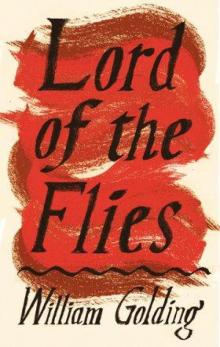 Lord of the Flies
Lord of the Flies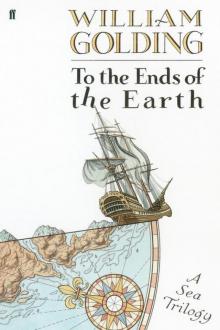 To the Ends of the Earth
To the Ends of the Earth Free Fall
Free Fall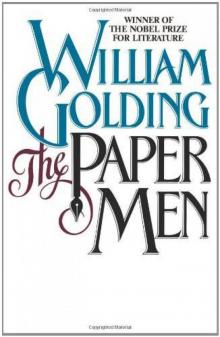 The Paper Men
The Paper Men The Spire
The Spire The Scorpion God: Three Short Novels
The Scorpion God: Three Short Novels The Inheritors
The Inheritors Darkness Visible: With an Introduction by Philip Hensher
Darkness Visible: With an Introduction by Philip Hensher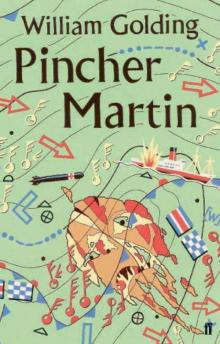 Pincher Martin
Pincher Martin The Pyramid
The Pyramid The Double Tongue
The Double Tongue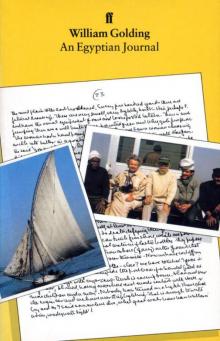 An Egyptian Journal
An Egyptian Journal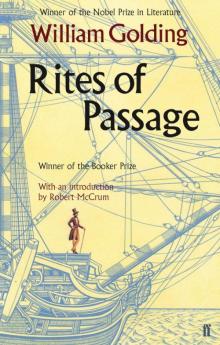 Rites of Passage
Rites of Passage Envoy Extraordinary
Envoy Extraordinary